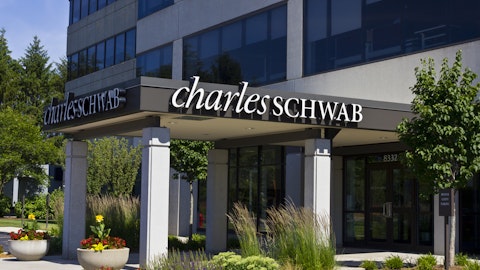In this article, we discuss the 5 stocks that billionaire Ken Fisher is selling. If you want our detailed analysis of Fisher’s investment philosophy, go directly to Billionaire Ken Fisher is Selling These 10 Stocks.
5. General Electric Company (NYSE:GE)
Number of Hedge Fund Holders: 53
General Electric Company (NYSE:GE) is a multinational conglomerate headquartered in Boston, Massachusetts, that specializes in aircraft engines, electrical distribution, electric motors, energy, software, and wind turbines.
Fisher Asset Management initially purchased a stake in General Electric Company (NYSE:GE) in Q4 2010, before selling its position in Q2 2012. The hedge fund reinvested in General Electric Company (NYSE:GE) in Q3 2012, and held the position consistently until selling it off in Q3 2017. Ken Fisher bought General Electric Company (NYSE:GE) shares again in Q4 2017, and sold the $2.1 million stake entirely in the third quarter of 2021.
On December 10, General Electric Company (NYSE:GE) declared a $0.08 per share quarterly dividend, in line with previous, which was paid on January 25.
Bernstein analyst Brendan Luecke initiated coverage of General Electric Company (NYSE:GE) on January 11 with an Outperform rating and a $120 price target. The analyst stated that the U.S. multi industry and electrical equipment sector is “at a time of great uncertainty”.
In the third quarter of 2021, 53 hedge funds were long General Electric Company (NYSE:GE), down from 67 funds in the preceding quarter. Andreas Halvorsen’s Viking Global is the biggest General Electric Company (NYSE:GE) stakeholder, with approximately 17 million shares worth $1.74 billion.
Here is what Vulcan Value Partners has to say about General Electric Company (NYSE:GE) in its Q3 2021 investor letter:
“During the quarter, we sold our positions in General Electric Co. General Electric is a company we followed for a long time. In the past, we removed GE from the MVP list due to management’s poor capital allocation decisions which resulted in value instability. Larry Culp, the former CEO of Danaher, became CEO of General Electric in 2018. The company implemented a vast restructuring program to simplify the industrial side of its business, sold off non-core assets, paid down debt with the proceeds, and drastically shrunk GE Capital. These restructuring activities allowed its world-class jet engine and healthcare businesses to shine through, and improved value stability. As a result, we added the company back to the MVP list. While the pandemic negatively impacted General Electric’s aviation business in the short run, it also gave us the opportunity to buy General Electric in the second quarter of 2020 with a substantial margin of safety. GE is a good example of a competitively entrenched, yet slower growing MVP business. As its stock price rose rapidly over the last year, its value growth did not keep up, and the price to value gap closed quickly. As our margin of safety diminished, we sold our position in GE and allocated it to more discounted companies.”
4. Zoom Video Communications, Inc. (NASDAQ:ZM)
Number of Hedge Fund Holders: 56
Zoom Video Communications, Inc. (NASDAQ:ZM) is an American software and communications technology company that offers its platform for teleconferencing, telecommuting, distance education, and social relations.
Ken Fisher purchased a $340,000 stake in Zoom Video Communications, Inc. (NASDAQ:ZM) in Q3 2020, and held the stake until Q2 2021, before selling his $231,000 position in the company in the third quarter of 2021.
On December 30, Citic Securities analyst Junyun Chen initiated coverage of Zoom Video Communications, Inc. (NASDAQ:ZM) with a Buy rating and a $260 price target. Zoom Video Communications, Inc. (NASDAQ:ZM)’s stock price has fallen by two-thirds from its peak last October, mainly reflecting market concerns about the decline in revenue growth after the pandemic, the loss of small and medium-sized business customers, and competition from Microsoft Corporation (NASDAQ:MSFT) Teams, the analyst told investors in a research note. However, current market concerns “are clearly excessive” and the stock is “oversold”, says the analyst, and despite the competition, Zoom Video Communications, Inc. (NASDAQ:ZM) maintains a “solid leading position.”
Chase Coleman’s Tiger Global Management is the largest Zoom Video Communications, Inc. (NASDAQ:ZM) stakeholder as of Q3 2021, with 4.76 million shares worth $1.24 billion. Overall, 56 hedge funds were long Zoom Video Communications, Inc. (NASDAQ:ZM) in the third quarter, with stakes equaling $6 billion.
Here is what Artisan Partners has to say about Zoom Video Communications, Inc. (NASDAQ:ZM) in its Q1 2021 investor letter:
“We concluded our campaigns in Zoom Video Communications. We have been paring our position in Zoom for several quarters, anticipating the reduced need for video conferencing as vaccination rates climb and people return to their workplaces. That said, we believe there is a strong case to be made that the pandemic has prompted a permanent inflection in video conferencing’s importance—sustainably higher remote work arrangements, more online learning and less business travel. Furthermore, the company’s dramatically expanded user base (up 485% YoY in Q3) positions it well to cross sell additional services, Zoom Phone in particular. The long-term future remains bright, but we decided to end our successful investment campaign in favor of opportunities in our pipeline with more attractive near-term growth prospects.”
3. Roku, Inc. (NASDAQ:ROKU)
Number of Hedge Fund Holders: 57
Roku, Inc. (NASDAQ:ROKU) is a California-based company that delivers consumer electronics and broadcast media for video streaming, and also distributes licensed hardware and software to other companies.
Fisher purchased a stake in Roku, Inc. (NASDAQ:ROKU) in Q3 2020, buying 1,431 shares worth $270,000. He sold off his stake in the fourth quarter of 2020. He once again acquired Roku, Inc. (NASDAQ:ROKU) shares in Q2 2021, worth $427,000, which he sold entirely in the third quarter.
On January 20, Deutsche Bank analyst Jeffrey Rand lowered the price target on Roku to $300 from $400 and kept a Buy rating on the shares. The stock has dropped 50% in the last three months and while short-term headwinds have increased during this time, the pullback is overdone, the analyst tells investors in a research note. According to Rand, Roku, Inc. (NASDAQ:ROKU) remains well positioned as the market leader in the “rapidly growing” connected TV market.
Among the hedge funds tracked by Insider Monkey in Q3 2021, Cathie Wood’s ARK Investment Management is the biggest Roku, Inc. (NASDAQ:ROKU) stakeholder, with 4.73 million shares worth $1.4 billion. Overall, 57 hedge funds reported owning stakes in Roku, Inc. (NASDAQ:ROKU), valued at $2.8 billion.
Here is what LRT Capital Management has to say about Roku, Inc. (NASDAQ:ROKU) in its Q3 2021 investor letter:
“Roku, Inc. (ROKU) – the streaming TV company is currently trading at the lowest valuation it has been in many years, despite reporting 50% revenue growth, and over 80% growth in its most important and profitable “Platform” segment. Ostensibly the risk of increased competition is weighing on the stock, in practice we believe Roku’s recent underperformance has more to do with it being the 4th largest holding in Cathy Wood’s ARKK ETF, which has been hammered by outflows in recent weeks. We wrote about Roku in our July Investor Letter.”
2. The Charles Schwab Corporation (NYSE:SCHW)
Number of Hedge Fund Holders: 59
The Charles Schwab Corporation (NYSE:SCHW) is a multinational financial services company, headquartered in Texas, providing services including commercial banking, stock brokerage, wealth management, and investment management.
Billionaire Ken Fisher first acquired a $219,000 stake in The Charles Schwab Corporation (NYSE:SCHW) in Q2 2015, which he sold in the next quarter. He then purchased 2,801 shares of The Charles Schwab Corporation (NYSE:SCHW) in Q2 2021, worth $204,000, which he sold off in the third quarter of 2021 entirely.
The Charles Schwab Corporation (NYSE:SCHW) posted its Q4 2021 results on January 18. The company announced earnings per share of $0.86, missing estimates by $0.02. Revenue for the quarter totaled $4.71 billion, up 12.74% on a year-over-year basis, but missed estimates by $79.07 million. The stock slid 5.3% after the Q4 results missed market consensus estimates.
On January 21, Argus analyst Stephen Biggar raised the price target on The Charles Schwab Corporation (NYSE:SCHW) to $100 from $90 and kept a Buy rating on the shares. While the company missed on Q4 earnings, its revenues rose 13%, led by growth in asset management fees, net interest income, and trading revenues, the analyst tells investors in a research note.
According to Insider Monkey’s Q3 data, 59 hedge funds were bullish on The Charles Schwab Corporation (NYSE:SCHW), down from 72 funds in the preceding quarter. John Armitage’s Egerton Capital Limited is the biggest stakeholder of the company, with a position worth over $1 billion.
Here is what Baron Asset Fund has to say about The Charles Schwab Corporation (NYSE:SCHW) in its Q4 2021 investor letter:
“The Fund’s Financials holdings appreciated by double-digit percentages, with online brokerage firm The Charles Schwab Corp. Schwab’s stock was up as the company’s continued success attracting new customers to its platform resulted in mid-single-digit organic revenue growth and more than $7.5 trillion in assets.”
1. CrowdStrike Holdings, Inc. (NASDAQ:CRWD)
Number of Hedge Fund Holders: 74
CrowdStrike Holdings, Inc. (NASDAQ:CRWD) is a technology company based in California, specializing in cybersecurity. Its services include endpoint security, security and IT operations, security cloud, threat intelligence, and cyber attack response solutions.
Billionaire Ken Fisher purchased 911 shares of CrowdStrike Holdings, Inc. (NASDAQ:CRWD) in the second quarter of 2021, worth $229,000, which he sold off entirely in Q3 2021.
Citi analyst Fatima Boolani on January 24 initiated coverage of CrowdStrike Holdings, Inc. (NASDAQ:CRWD) with a Buy rating and a $220 price target. The analyst observed that the disaggregation of the corporate network and cyber attack surface puts CrowdStrike Holdings, Inc. (NASDAQ:CRWD) in a solid position to seize the shift in cybersecurity spend.
Among the hedge funds monitored by Insider Monkey in Q3 2021, Matrix Capital Management is one of the leading stakeholders of CrowdStrike Holdings, Inc. (NASDAQ:CRWD), with 3 million shares worth $737.3 million. Overall, 74 hedge funds were long CrowdStrike Holdings, Inc. (NASDAQ:CRWD) in the third quarter, up from 66 funds in the preceding quarter.
Here is what Baron Opportunity Fund has to say about CrowdStrike Holdings, Inc. (NASDAQ:CRWD) in its Q3 2021 investor letter:
“CrowdStrike, Inc. – CrowdStrike disrupted the cybersecurity market with a cloud-native endpoint protection solution, replacing the legacy anti-virus tools used to protect computers, smartphones, and the like. Today, CrowdStrike offers over 20 different modules – collecting data once and analyzing it in different ways – to protect enterprise endpoints and cloud workloads from many different types of cyber threats, and providing threat intelligence, cyber analytics, vulnerability management, and automated and people-based remediation services. CrowdStrike has a highly efficient go-to-market motion because its single, integrated, cloud-native platform enables existing and new customers to start free in-App trials at the click of a button to try out CrowdStrike’s offerings for themselves. We believe these new TAMs have enabled CrowdStrike to expand its addressable market over five times from its initial offering and should yield over 30% growth for the next several years.”
You can also take a look at 12 Penny Stocks Most Popular on Reddit and Robinhood and Billionaire Stephen Mandel’s Portfolio: 8 New Stock Picks.





